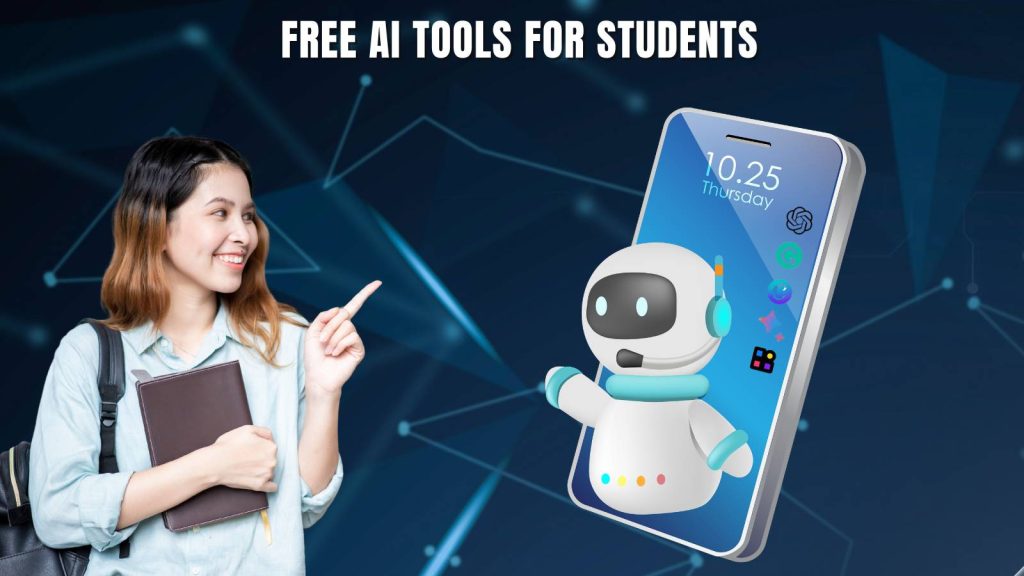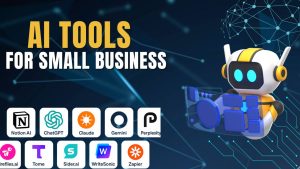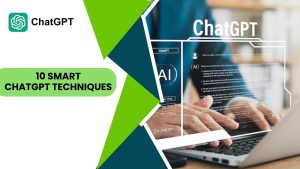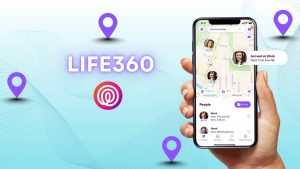In today’s fast-paced academic environment, students are expected to manage a heavy workload—balancing lectures, assignments, research, and exam preparation—all while keeping up with extracurricular activities and part-time jobs. The reality is that time is one of the scarcest resources for students, and learning how to use it effectively can make all the difference.
Top 10 Public APIs for Building AI Apps: Best AI APIs in 2025
This is where free AI tools for students come in. These tools do more than just provide answers—they help you understand concepts, organize your studies, manage time efficiently, and even make learning enjoyable. From breaking down complex theories into simpler terms to creating personalized quizzes and study plans, AI can be the ultimate academic assistant that works with you around the clock.
Here are the best AI tools that are free to use, broken down into categories based on their functions, so you can choose exactly what fits your study style and academic needs.
Why AI is a Game-Changer for Students
AI has shifted the way students approach learning. In the past, studying meant manually taking notes, spending hours flipping through textbooks, and hoping to remember what you needed for exams. Now, students can use AI to scan through entire textbooks in minutes, highlight the most important sections, and even receive instant explanations for difficult topics.
Beauty of free AI tools for students is that they adapt to individual learning preferences. If you’re a visual learner, AI can create diagrams and infographics. If you learn better through repetition, it can generate flashcards and quizzes. For analytical learners, AI can provide step-by-step reasoning for problems in math, science, and other technical subjects.
Additionally, AI reduces the frustration that comes with studying alone. You can ask it the same question multiple times, request different explanations, or ask for real-world examples until you truly understand the concept. This adaptability is something that traditional study methods can rarely offer.
Best AI Tools for Note-Taking and Organization
Good note-taking is the foundation of effective studying, but traditional note-taking can be messy, unorganized, and hard to search through later. AI-powered note-taking tools not only store your notes in one place but also organize them intelligently so you can access exactly what you need when you need it.
- Notion AI – With Notion’s AI features, you can upload raw lecture notes, and it will automatically summarize them, identify important topics, and even suggest follow-up reading materials. If you’re working on group projects, Notion AI can also help coordinate task assignments, deadlines, and shared resources, keeping everyone on track.
- Obsidian with AI Plugins – Obsidian allows you to create a visual “knowledge graph” that connects related ideas across multiple subjects. The AI plugins can detect hidden connections, making it easier to spot patterns in your learning. For example, a student studying literature might discover thematic links between works from different periods, deepening their understanding.
- Google Keep + AI Integrations – Great for students who want quick, portable note-taking. You can dictate notes during a lecture, and AI integrations will transcribe, format, and tag them automatically. These smart tags make it simple to search and retrieve notes later without digging through pages.
These tools transform notes from static information into interactive study resources you can use to prepare for exams efficiently.
AI Tools for Faster Research and Information Gathering
Research is one of the most time-consuming tasks in academia. Between finding credible sources, filtering out irrelevant data, and compiling references, hours can disappear quickly. AI-powered research tools cut down this time dramatically.
- Perplexity AI – Unlike traditional search engines, Perplexity delivers concise, well-researched answers with cited sources. This means you can verify the accuracy of the information instantly, making it perfect for academic writing where credibility is essential.
- ChatGPT (Free Version) – Even in its free form, ChatGPT is a powerful brainstorming partner. You can ask it to generate thesis ideas, outline essays, or explain difficult theories in plain language. For example, if you’re writing a political science paper, ChatGPT can help break down complex policies into easy-to-understand points with relevant examples.
- Scholarcy – Designed specifically for academic work, Scholarcy summarizes long research papers into digestible bullet points. It highlights the methodology, key findings, and conclusions, so you can decide quickly whether the paper is relevant to your study without reading it in full.
Using these AI research tools means you spend less time searching and more time analyzing and writing.
AI Study Assistants for Understanding Complex Topics
Some subjects can feel intimidating, especially when textbooks and research papers are packed with technical language. AI study assistants are designed to simplify these materials without losing their accuracy.
- Explainpaper – Ideal for students struggling with dense academic articles, Explainpaper allows you to upload a paper and then highlights confusing sentences so it can rewrite them in simpler language. This is particularly useful in science and engineering fields where terms can be highly technical.
- Elicit – Elicit takes a more research-oriented approach, pulling together information from multiple academic sources, organizing it into themes, and helping you see the bigger picture. This makes it easier to write literature reviews or identify gaps in research.
- QuillBot – While it’s best known for paraphrasing, QuillBot also offers grammar checks, sentence rephrasing for clarity, and vocabulary enhancement. It’s a great tool for students writing essays in a second language or those wanting to make their work sound more professional.
These tools don’t just make information easier to understand—they help you actively engage with it.
AI-Powered Flashcards and Memory Boosters
Memorization is still an essential part of studying, especially for subjects like medicine, law, and languages. AI-enhanced flashcard tools make this process far more efficient.
- Anki with AI Add-ons – Anki uses spaced repetition to help you review information at scientifically calculated intervals. With AI add-ons, you can generate flashcards automatically from your notes, saving hours of manual work.
- Quizlet AI – Instead of writing questions by hand, Quizlet AI can turn any study material into interactive quizzes, games, and multiple-choice tests, making revision more engaging.
- RemNote – This tool combines note-taking with automated flashcard creation, meaning that every time you write down a definition or important fact, it can instantly be turned into a flashcard for later review.
By integrating these into your daily routine, you can boost memory retention while spending less time creating study materials.
AI Writing and Essay Help Tools
Writing is a skill that requires not only creativity but also clarity, coherence, and correct grammar. AI writing assistants can help polish your work while teaching you how to improve.
- Grammarly – Beyond basic spelling and grammar, Grammarly evaluates your tone, clarity, and conciseness. It’s also a great plagiarism checker for academic writing.
- Scribbr’s AI Proofreader – This is specifically designed for students and academic professionals. It checks for proper citation formats (APA, MLA, Chicago), making it ideal for dissertations or thesis work.
- Wordtune – Helps rewrite sentences for better flow without changing the original meaning. For example, a stiff academic sentence can be rephrased to sound smoother while still maintaining a professional tone.
These tools make your writing more professional, persuasive, and reader-friendly.
AI Tools for Math, Science, and Problem-Solving
STEM subjects often require step-by-step reasoning, and AI tools can break down these steps in a clear, logical manner.
- Wolfram Alpha – Goes far beyond calculators, offering detailed solutions for complex equations, chemical reactions, and statistical problems.
- Photomath – Great for visual learners who want to see how each step of a math problem is solved. Simply scan the problem with your phone to get a detailed explanation.
- Symbolab – Covers a wide range of mathematical problems, from algebra to calculus, and provides alternate solution methods to help deepen your understanding.
With these tools, you not only get the answer but also the method, which is crucial for mastering problem-solving.
AI Language Learning Tools for Students
Language learning requires consistent practice, and AI makes this easier by creating tailored learning experiences.
- Duolingo Max (AI Features) – Adapts lesson difficulty based on your performance, offers instant feedback, and explains mistakes to help you avoid repeating them.
- LingQ + AI Reading Assistant – Lets you read authentic articles while the AI explains unfamiliar words and grammar, making the learning process more natural.
- ChatGPT for Language Practice – You can practice conversations in real-time, request translations, and receive instant grammar corrections.
These tools combine vocabulary building, grammar improvement, and conversational practice for a well-rounded learning experience.
AI Tools for Exam Preparation and Practice Tests
Preparing for exams requires both knowledge and strategy. AI tools help simulate test conditions and focus your revision where it’s needed most.
- PrepAI – Generates quizzes from your lecture notes or textbooks, helping you actively recall information instead of passively reviewing it.
- Khan Academy’s Khanmigo – Offers guided practice with hints, explanations, and structured lessons in a wide variety of subjects.
- TestPrep AI – Lets you design practice exams with time limits and automatic scoring, helping you get comfortable with real exam conditions.
By using these tools, you can identify weak areas before exam day and walk in feeling more confident.
How to Use AI Tools Responsibly as a Student
While free AI tools for students are incredibly helpful, using them responsibly is crucial. Copy-pasting AI-generated content without understanding it can lead to academic dishonesty and poor exam performance. Always double-check AI outputs with credible sources, use them to enhance your understanding, and ensure your final work reflects your own learning.
Remember, AI is a supplement, not a substitute, for your own skills and knowledge. The most successful students use it as a tool for deeper understanding rather than a shortcut to avoid studying.
By integrating these tools into your study routine—and using them responsibly—you can make your learning process more efficient, enjoyable, and ultimately more successful. The future of studying is here, and it’s powered by AI.
FAQs
1. What are the best free AI tools for students in 2025?
Some of the best free AI tools for students include ChatGPT (Free Version) for quick explanations, Perplexity AI for research, Notion AI for organizing notes, Quizlet AI for flashcards, Wolfram Alpha for problem-solving, and Grammarly for improving writing. These tools are free to start and provide essential academic support for various subjects.
2. Are free AI tools for students safe to use?
Most reputable free AI tools for students, like Google’s AI integrations, Grammarly, and Khan Academy’s Khanmigo, are safe when used properly. However, students should avoid sharing sensitive personal information and always verify information generated by AI to ensure accuracy.
3. Can AI tools help students prepare for exams more effectively?
Yes, AI tools can create custom quizzes, generate practice tests, summarize notes, and provide instant explanations for difficult topics. For example, PrepAI can generate questions from your study material, while Khanmigo offers personalized tutoring to strengthen weak areas before an exam.
4. Are there any completely free AI tools with no paid upgrades?
Some AI tools like Perplexity AI, Photomath, and Scholarcy’s free plan offer strong functionality without requiring payment. However, many tools operate on a freemium model, where basic features are free but advanced options require a subscription.
5. How can AI help students with note-taking?
AI tools like Notion AI and Obsidian AI plugins can automatically summarize lectures, highlight important points, and organize content into categories. This saves students time and ensures their notes are well-structured for easy revision.
6. Do free AI tools for students work offline?
Most AI tools require an internet connection to function, as they rely on cloud-based processing. However, some, like Anki (with pre-downloaded decks) and Obsidian, allow offline usage once content is set up.
7. Can AI tools replace traditional studying methods?
AI tools should complement, not replace, traditional learning. They are excellent for speeding up research, clarifying concepts, and creating personalized study materials, but active learning, reading textbooks, and practicing problems remain essential for long-term understanding.
8. Which AI tools are best for language learning?
For language learners, Duolingo Max (AI-powered), LingQ, and using ChatGPT for conversation practice are excellent choices. These tools adapt lessons to your proficiency level and make learning interactive through quizzes, dialogues, and vocabulary drills.
9. How do I choose the right AI tool for my studies?
Consider your needs first—if you struggle with writing, Grammarly or Wordtune can help. For math and science, Wolfram Alpha and Photomath are better options. Students should test a few tools and see which best fits their study habits and learning goals.
10. Can free AI tools help improve time management for students?
Yes, AI tools like Google Keep, Notion AI, and Todoist AI integrations can create smart reminders, organize schedules, and prioritize tasks. This helps students allocate their time efficiently, avoid last-minute cramming, and maintain a balanced study routine.






